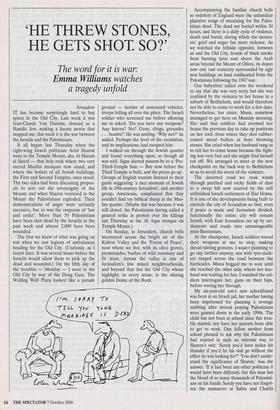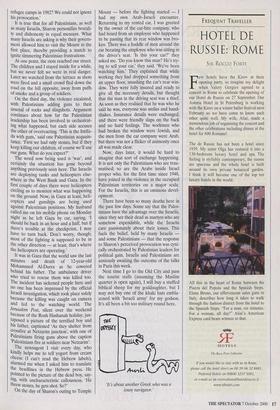`HE THREW STONES, HE GETS SHOT. SO?'
The word for it is war:
Emma Williams watches
a tragedy unfold
Jerusalem IT has become surprisingly hard to buy spices in the Old City. Last week it was Jean-Claude Van Damme, dressed as a Hasidic Jew, making a karate movie that stopped me; this week it is the war between the Israelis and the Palestinians.
It all began last Thursday when the right-wing Israeli politician Ariel Sharon went to the Temple Mount, aka Al Haram al Sharif — that holy rock where two very sacred Muslim mosques now stand, and where the holiest of all Jewish buildings, the First and Second Temples, once stood. The two sides had been discussing propos- als to sort out the sovereignty of the Mount; and when Sharon ventured to the Mount the Palestinians exploded. Their demonstrations of anger were certainly excessive, but so was the response of law and order'. More than 50 Palestinians have been shot dead by the Israelis in the past week and almost 2,000 have been wounded.
The first we knew of what was going on was when we saw legions of ambulances heading for the Old City. (Uselessly, as I learnt later. It was several hours before the Israelis would allow them to pick up the dead and wounded.) On the fifth day of the troubles — Monday — I went to the Old City by way of the Dung Gate. The Wailing Wall Plaza looked like a parade ground — hordes of armoured vehicles, troops lolling all over the place. The Israeli soldier who screened me before allowing me in asked, `Do you have any weapons? Any knives? No? Guns, slings, grenades . . . bombs?' He was smiling. 'Why not?' he added. Perhaps the level of the escalation, and its implications, had escaped him.
I walked on through the Jewish quarter and found everything open, as though all was well. Signs alerted passers-by to a 'Pre- Third-Temple Sale — Buy now before the Third Temple is built, and the prices go up'. Groups of English tourists listened to their guide suggesting 'a nice museum of Jewish life in 19th-century Jerusalem', and another group, Americans, complained that they couldn't find toy biblical sheep in the Mus- lim quarter. (Maybe this was because it was still closed, the Palestinians having called a general strike in protest over the killings last Thursday at the Al Aqsa mosque on Temple Mount.) On Sunday, in Jerusalem, church bells murmured across the bright air of the Kidron Valley and the 'Forest of Peace', near where we live, with its olive groves, promenades, bushes of wild rosemary and fir trees. Across the valley is one of Jerusalem's few mixed neighbourhoods, and beyond that lies the Old City whose highlight, in every sense, is the shining golden Dome of the Rock. Accompanying the familiar church bells so redolent of England were the unfamiliar plaintive songs of mourning for the Pales- tinian dead. The dead are buried within 24 hours, and there is a daily cycle of violence, death and burial, during which the mourn- ers' grief and anger fan more violence. As we watched the hillside opposite, between us and the Old City, fronds of black smoke from burning tyres rose above the Arab areas beyond the Mount of Olives, its slopes now one vast cemetery surrounded by ugly new buildings on land confiscated from the Palestinians following the 1967 war.
Our babysitter called over the weekend to say that she was very sorry but she was confined by the violence to her house in a suburb of Bethlehem, and would therefore not be able to come to work for a few days. Nevertheless, her sister, Muna, somehow managed to get here on Monday morning. She said that soldiers had stormed her house the previous day to take up positions on her roof, from where they shot rubber- coated metal bullets at boys throwing stones. She cried when her husband rang us to tell her to come home because the fight- ing was very bad and she might find herself cut off. We arranged to meet at the new checkpoint on the back way to Bethlehem so as to avoid the worst of the violence.
The deserted road we took winds through parched and rocky fields of dust to a steep hill now scarred by the still unfinished Israeli settlement of Har Homa. It is one of the developments being built to encircle the city of Jerusalem so that, even if peace is made and Jerusalem divided, functionally the entire city will remain Israeli, with East Jerusalem cut up by set- tlements and roads into unmanageable mini-Bantustans.
At the checkpoint, Israeli soldiers waved their weapons at me to stop, making throat-slitting gestures. I wasn't planning to go any further anyway, not with tyre-slash- ers ranged across the road between the barricades. Muna begged me to wait until she reached the other side, where her hus- band was waiting for her. I watched the sol- diers interrogate her, guns on their hips, before waving her through.
My six-year-old son's new schoolfriend was born in an Israeli jail, her mother having been imprisoned for planning a revenge stabbing after several praying Palestinians were gunned down in the early 1990s. The child has not been at school since this trou- ble started, nor have her parents been able to get to work. One fellow mother from school phoned to ask why the Palestinians had reacted in such an extreme way to Sharon's visit: 'Surely you'd have stolen his thunder if you'd let his visit go without the effect he was looking for?' You don't under- stand the significance of Sharon,' was the answer. 'If it had been any other politician it would have been different, but this man has the blood of so many thousands of Palestini- ans on his hands. Surely you have not forgot- ten the massacres at Sabra and Chatila refugee camps in 1982? We could not ignore his provocation.'
It is true that for all Palestinians, as well as many Israelis, Sharon personifies brutali- ty and dishonesty in equal measure. What many Israelis are asking is why their govern- ment allowed him to visit the Mount in the first place, thereby providing a match to ignite simmering Palestinian frustrations.
At one point, the riots reached our street. The children and I stayed inside for a while, but we never felt we were in real danger. Later we watched from the terrace as shots were fired and a small crowd fled down the road on the hill opposite, away from puffs of smoke and a group of soldiers.
On the third day, the violence escalated, with Palestinians adding guns to their arsenal of rocks and slingshots. Argument continues about how far the Palestinian leadership has been involved in orchestrat- ing what happened, but each side accuses the other of overreacting. 'This is the Intifa- da with guns,' said one Palestinian acquain- tance. 'First we had only stones, but if they keep killing our children, of course we'll use our guns. What do you expect?'
The word now being used is 'war', and certainly the situation has gone beyond anything previously seen here. The Israelis are deploying tanks and helicopters else- where in the West Bank and Gaza. In the first couple of days there were helicopters circling us to monitor what was happening on the ground. Now, in Gaza at least, heli- copters and gunships are being used against Palestinian positions. My husband called me on his mobile phone on Monday night as he left Gaza by car, saying, 'I should be back in an hour and a half, but if there's trouble at the checkpoint, I may have to turn back. Don't worry, though; most of the fighting is supposed to be in the other direction — at least, that's where the helicopters are operating.' It was in Gaza that the world saw the last minutes and death of 12-year-old Mohammed Al-Durra as he cowered behind his father. The ambulance driver who tried to rescue them was killed too. The incident has sickened people here and no one has been impressed by the official Israeli investigation, which took place solely because the killing was caught on camera and fed to the watching world. The Jerusalem Post, silent over the weekend because of the Rosh Hashanah holiday, jux- taposed a picture of the terrified boy and his father, captioned 'As they shelter from crossfire at Netzarim junction', with one of Palestinians firing guns above the caption Palestinians fire at soldiers near Netzarim'.
The newsagent I visit every day, who kindly helps me to tell yogurt from cream cheese (I can't read the Hebrew labels), alarmed me when I asked him to translate the headlines in the Hebrew press. He pointed to the picture of the dead boy, say- ing, with uncharacteristic callousness, 'He threw stones, he gets shot. So?' On the day of Sharon's outing to Temple Mount — before the fighting started — I had my own Arab–Israeli encounter. Returning to my rented car, I was greeted by the owner of the car-hire company, who had heard from an employee who happened to be passing that its rear window was bro- ken. There was a huddle of men around the car berating the employee who was sitting in the driver's seat. 'Is this your car?' they asked me. 'Do you know this man? He's try- ing to sell your car,' they said. 'We've been watching him.' They explained that while working they had dropped something from an upper floor, smashing the car's rear win- dow. They were fully insured and ready to give all the necessary details, but thought that the man in the driving seat was a thief. As soon as they realised that he was who he said he was, everyone was smiles and hand- shakes. Insurance details were exchanged, and there were friendly slaps on the back and no hard feelings. The workmen who had broken the window were Jewish, and the men from the car company were Arab, but there was not a flicker of animosity once all was made clear.
Now, days later, it would be hard to imagine that sort of exchange happening. It is not only the Palestinians who are trau- matised; so are the Arabs inside Israel proper who, for the first time since 1948, have joined in the violence in the occupied Palestinian territories on a major scale. For the Israelis, this is an ominous devel- opment.
There have been so many deaths here in the past few days. Some say that the Pales- tinians have the advantage over the Israelis, since they see their dead as martyrs who are somehow expendable, while the Israelis care passionately about their losses. This fuels the belief, held by many Israelis and some Palestinians — that the response to Sharon's perceived provocation was cyni- cally orchestrated by Palestinian leaders for political gain. Israelis and Palestinians are anxiously awaiting the outcome of the talks in Paris this week.
Next time I go to the Old City and pass the tourist stalls (assuming the Muslim quarter is open again), I will buy a stuffed biblical sheep for my goddaughter, but I may not buy one of the khaki hats embla- zoned with 'Israeli army' for my godson. It's all been a bit too military round here.
It's about another Greek who was a lousy navigator.'



















































































 Previous page
Previous page